Management and Operations Report: Leadership Theories for Greggs Plc
VerifiedAdded on 2019/12/18
|16
|5646
|185
Report
AI Summary
This report provides an in-depth analysis of leadership and management operations within Greggs Plc. It begins by differentiating between the roles of a leader and a manager, outlining their responsibilities, characteristics, and approaches to decision-making, conflict resolution, and risk-taking. The report then explores the application of leadership theories such as situational, system, and contingency leadership, highlighting their relevance in achieving business objectives. Furthermore, it delves into various leadership models, including trait, behavioral, human relations, and chaos theories, examining their strengths and weaknesses. The report emphasizes the importance of adapting leadership styles to specific situations to enhance performance and drive growth within Greggs Plc.
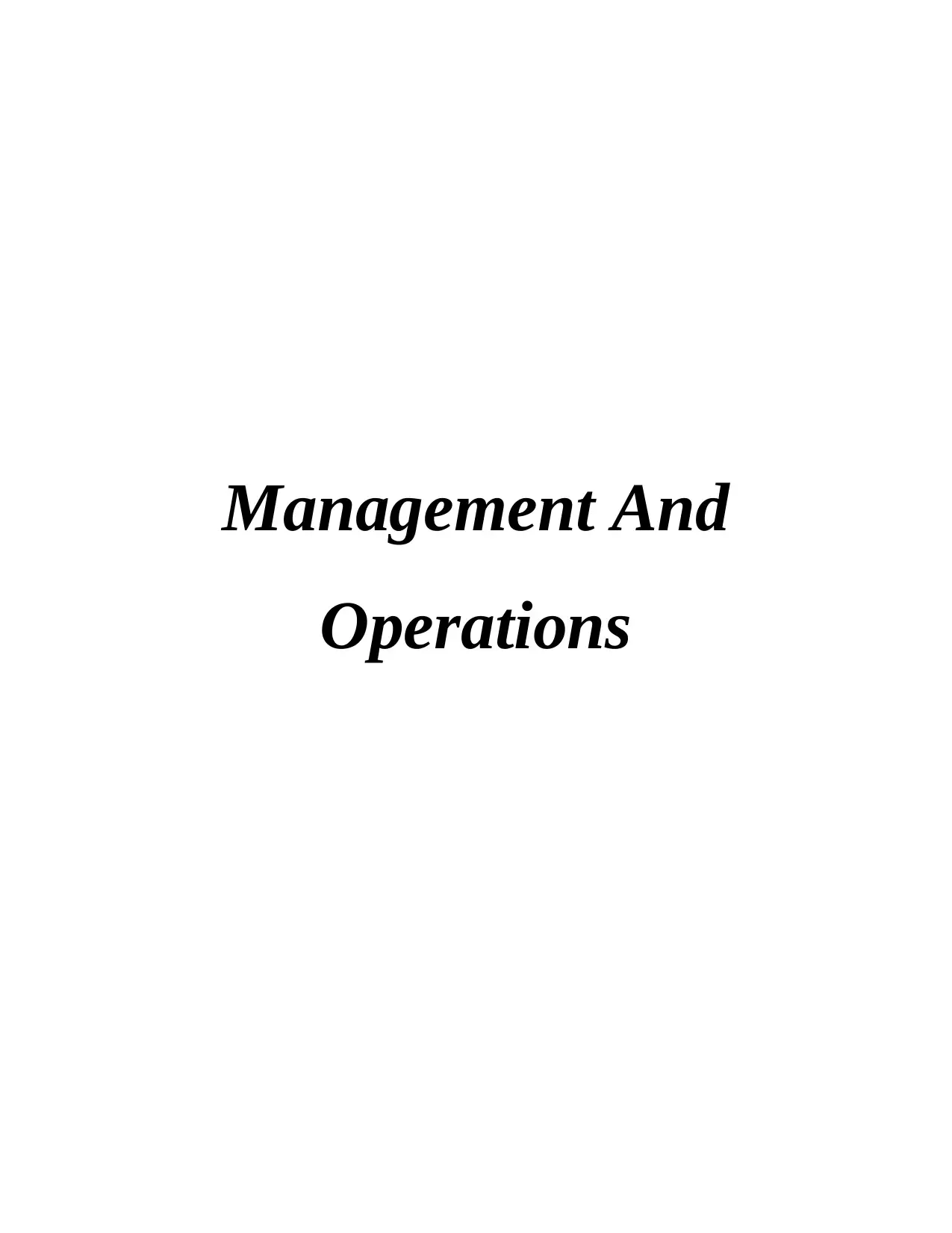
Management And
Operations
Operations
Paraphrase This Document
Need a fresh take? Get an instant paraphrase of this document with our AI Paraphraser
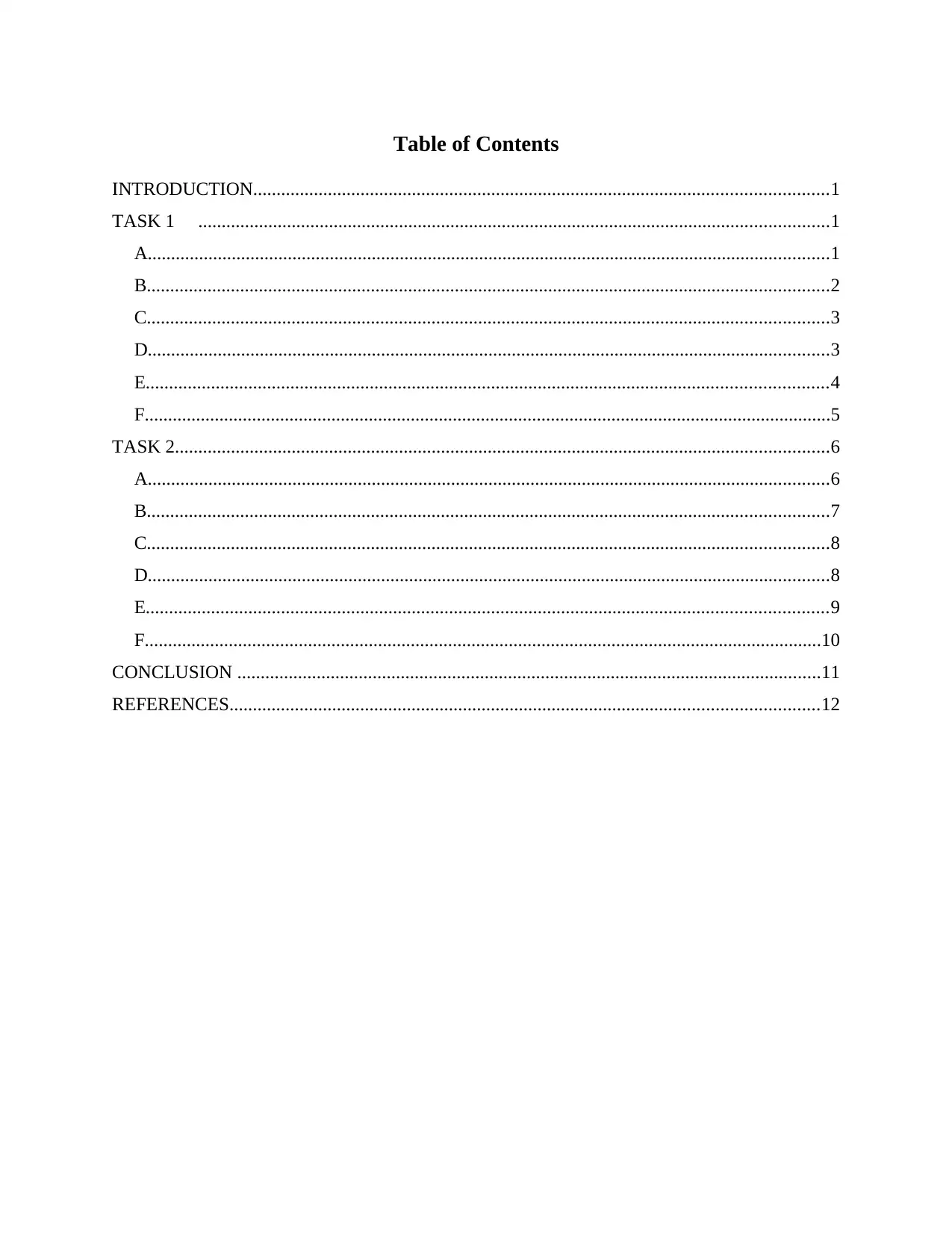
Table of Contents
INTRODUCTION...........................................................................................................................1
TASK 1 .......................................................................................................................................1
A..................................................................................................................................................1
B..................................................................................................................................................2
C..................................................................................................................................................3
D..................................................................................................................................................3
E..................................................................................................................................................4
F...................................................................................................................................................5
TASK 2............................................................................................................................................6
A..................................................................................................................................................6
B..................................................................................................................................................7
C..................................................................................................................................................8
D..................................................................................................................................................8
E..................................................................................................................................................9
F.................................................................................................................................................10
CONCLUSION .............................................................................................................................11
REFERENCES..............................................................................................................................12
INTRODUCTION...........................................................................................................................1
TASK 1 .......................................................................................................................................1
A..................................................................................................................................................1
B..................................................................................................................................................2
C..................................................................................................................................................3
D..................................................................................................................................................3
E..................................................................................................................................................4
F...................................................................................................................................................5
TASK 2............................................................................................................................................6
A..................................................................................................................................................6
B..................................................................................................................................................7
C..................................................................................................................................................8
D..................................................................................................................................................8
E..................................................................................................................................................9
F.................................................................................................................................................10
CONCLUSION .............................................................................................................................11
REFERENCES..............................................................................................................................12
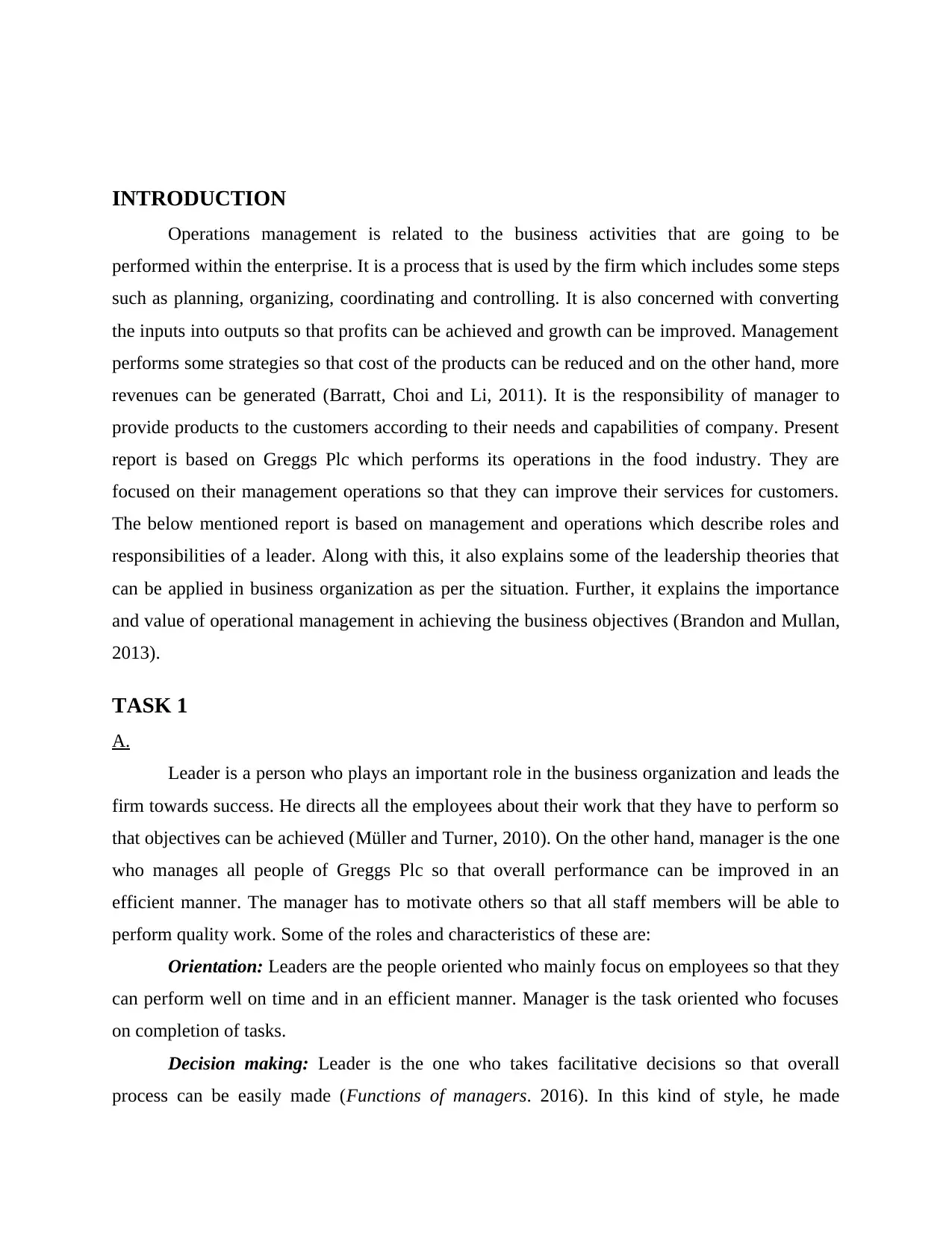
INTRODUCTION
Operations management is related to the business activities that are going to be
performed within the enterprise. It is a process that is used by the firm which includes some steps
such as planning, organizing, coordinating and controlling. It is also concerned with converting
the inputs into outputs so that profits can be achieved and growth can be improved. Management
performs some strategies so that cost of the products can be reduced and on the other hand, more
revenues can be generated (Barratt, Choi and Li, 2011). It is the responsibility of manager to
provide products to the customers according to their needs and capabilities of company. Present
report is based on Greggs Plc which performs its operations in the food industry. They are
focused on their management operations so that they can improve their services for customers.
The below mentioned report is based on management and operations which describe roles and
responsibilities of a leader. Along with this, it also explains some of the leadership theories that
can be applied in business organization as per the situation. Further, it explains the importance
and value of operational management in achieving the business objectives (Brandon and Mullan,
2013).
TASK 1
A.
Leader is a person who plays an important role in the business organization and leads the
firm towards success. He directs all the employees about their work that they have to perform so
that objectives can be achieved (Müller and Turner, 2010). On the other hand, manager is the one
who manages all people of Greggs Plc so that overall performance can be improved in an
efficient manner. The manager has to motivate others so that all staff members will be able to
perform quality work. Some of the roles and characteristics of these are:
Orientation: Leaders are the people oriented who mainly focus on employees so that they
can perform well on time and in an efficient manner. Manager is the task oriented who focuses
on completion of tasks.
Decision making: Leader is the one who takes facilitative decisions so that overall
process can be easily made (Functions of managers. 2016). In this kind of style, he made
Operations management is related to the business activities that are going to be
performed within the enterprise. It is a process that is used by the firm which includes some steps
such as planning, organizing, coordinating and controlling. It is also concerned with converting
the inputs into outputs so that profits can be achieved and growth can be improved. Management
performs some strategies so that cost of the products can be reduced and on the other hand, more
revenues can be generated (Barratt, Choi and Li, 2011). It is the responsibility of manager to
provide products to the customers according to their needs and capabilities of company. Present
report is based on Greggs Plc which performs its operations in the food industry. They are
focused on their management operations so that they can improve their services for customers.
The below mentioned report is based on management and operations which describe roles and
responsibilities of a leader. Along with this, it also explains some of the leadership theories that
can be applied in business organization as per the situation. Further, it explains the importance
and value of operational management in achieving the business objectives (Brandon and Mullan,
2013).
TASK 1
A.
Leader is a person who plays an important role in the business organization and leads the
firm towards success. He directs all the employees about their work that they have to perform so
that objectives can be achieved (Müller and Turner, 2010). On the other hand, manager is the one
who manages all people of Greggs Plc so that overall performance can be improved in an
efficient manner. The manager has to motivate others so that all staff members will be able to
perform quality work. Some of the roles and characteristics of these are:
Orientation: Leaders are the people oriented who mainly focus on employees so that they
can perform well on time and in an efficient manner. Manager is the task oriented who focuses
on completion of tasks.
Decision making: Leader is the one who takes facilitative decisions so that overall
process can be easily made (Functions of managers. 2016). In this kind of style, he made
⊘ This is a preview!⊘
Do you want full access?
Subscribe today to unlock all pages.

Trusted by 1+ million students worldwide
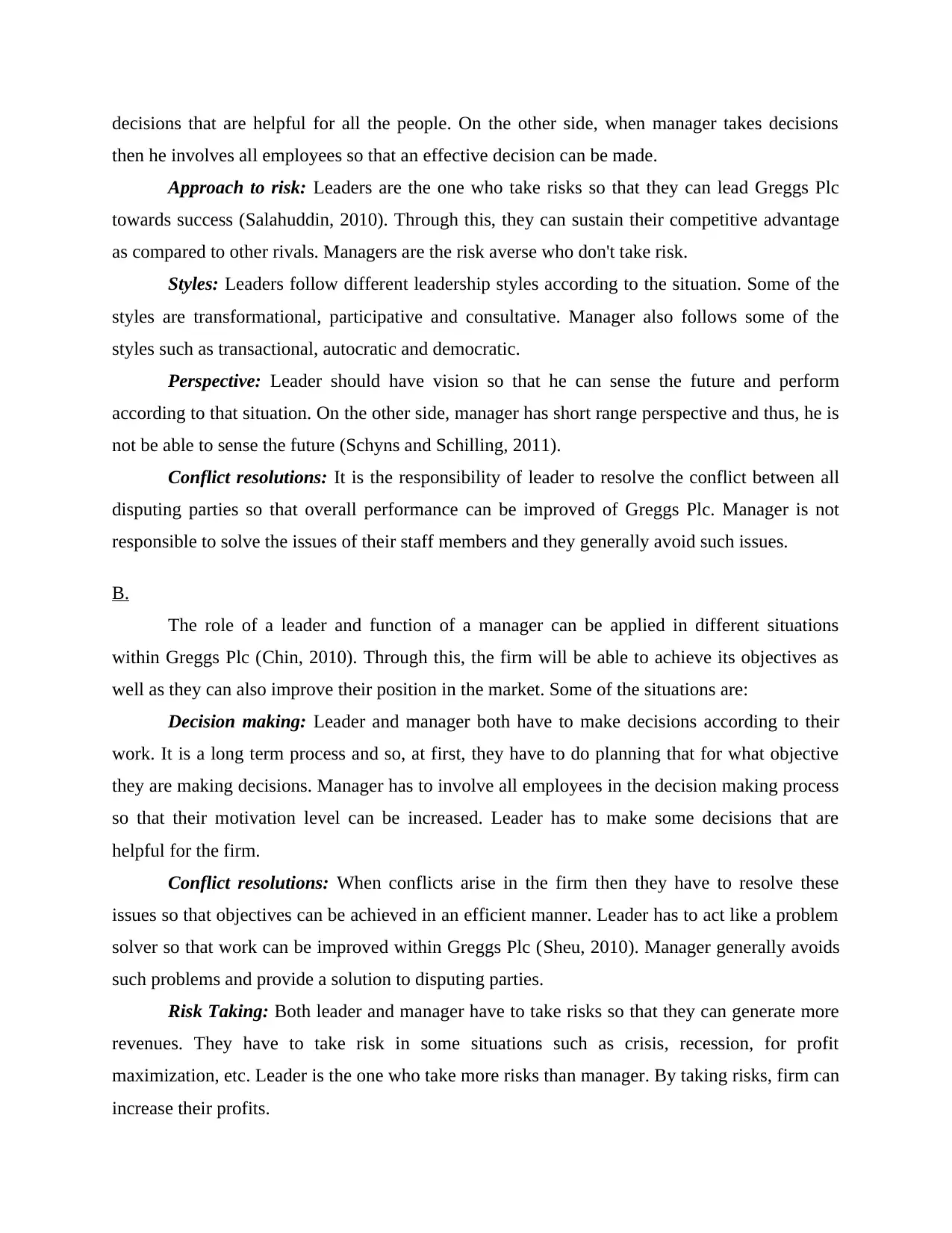
decisions that are helpful for all the people. On the other side, when manager takes decisions
then he involves all employees so that an effective decision can be made.
Approach to risk: Leaders are the one who take risks so that they can lead Greggs Plc
towards success (Salahuddin, 2010). Through this, they can sustain their competitive advantage
as compared to other rivals. Managers are the risk averse who don't take risk.
Styles: Leaders follow different leadership styles according to the situation. Some of the
styles are transformational, participative and consultative. Manager also follows some of the
styles such as transactional, autocratic and democratic.
Perspective: Leader should have vision so that he can sense the future and perform
according to that situation. On the other side, manager has short range perspective and thus, he is
not be able to sense the future (Schyns and Schilling, 2011).
Conflict resolutions: It is the responsibility of leader to resolve the conflict between all
disputing parties so that overall performance can be improved of Greggs Plc. Manager is not
responsible to solve the issues of their staff members and they generally avoid such issues.
B.
The role of a leader and function of a manager can be applied in different situations
within Greggs Plc (Chin, 2010). Through this, the firm will be able to achieve its objectives as
well as they can also improve their position in the market. Some of the situations are:
Decision making: Leader and manager both have to make decisions according to their
work. It is a long term process and so, at first, they have to do planning that for what objective
they are making decisions. Manager has to involve all employees in the decision making process
so that their motivation level can be increased. Leader has to make some decisions that are
helpful for the firm.
Conflict resolutions: When conflicts arise in the firm then they have to resolve these
issues so that objectives can be achieved in an efficient manner. Leader has to act like a problem
solver so that work can be improved within Greggs Plc (Sheu, 2010). Manager generally avoids
such problems and provide a solution to disputing parties.
Risk Taking: Both leader and manager have to take risks so that they can generate more
revenues. They have to take risk in some situations such as crisis, recession, for profit
maximization, etc. Leader is the one who take more risks than manager. By taking risks, firm can
increase their profits.
then he involves all employees so that an effective decision can be made.
Approach to risk: Leaders are the one who take risks so that they can lead Greggs Plc
towards success (Salahuddin, 2010). Through this, they can sustain their competitive advantage
as compared to other rivals. Managers are the risk averse who don't take risk.
Styles: Leaders follow different leadership styles according to the situation. Some of the
styles are transformational, participative and consultative. Manager also follows some of the
styles such as transactional, autocratic and democratic.
Perspective: Leader should have vision so that he can sense the future and perform
according to that situation. On the other side, manager has short range perspective and thus, he is
not be able to sense the future (Schyns and Schilling, 2011).
Conflict resolutions: It is the responsibility of leader to resolve the conflict between all
disputing parties so that overall performance can be improved of Greggs Plc. Manager is not
responsible to solve the issues of their staff members and they generally avoid such issues.
B.
The role of a leader and function of a manager can be applied in different situations
within Greggs Plc (Chin, 2010). Through this, the firm will be able to achieve its objectives as
well as they can also improve their position in the market. Some of the situations are:
Decision making: Leader and manager both have to make decisions according to their
work. It is a long term process and so, at first, they have to do planning that for what objective
they are making decisions. Manager has to involve all employees in the decision making process
so that their motivation level can be increased. Leader has to make some decisions that are
helpful for the firm.
Conflict resolutions: When conflicts arise in the firm then they have to resolve these
issues so that objectives can be achieved in an efficient manner. Leader has to act like a problem
solver so that work can be improved within Greggs Plc (Sheu, 2010). Manager generally avoids
such problems and provide a solution to disputing parties.
Risk Taking: Both leader and manager have to take risks so that they can generate more
revenues. They have to take risk in some situations such as crisis, recession, for profit
maximization, etc. Leader is the one who take more risks than manager. By taking risks, firm can
increase their profits.
Paraphrase This Document
Need a fresh take? Get an instant paraphrase of this document with our AI Paraphraser
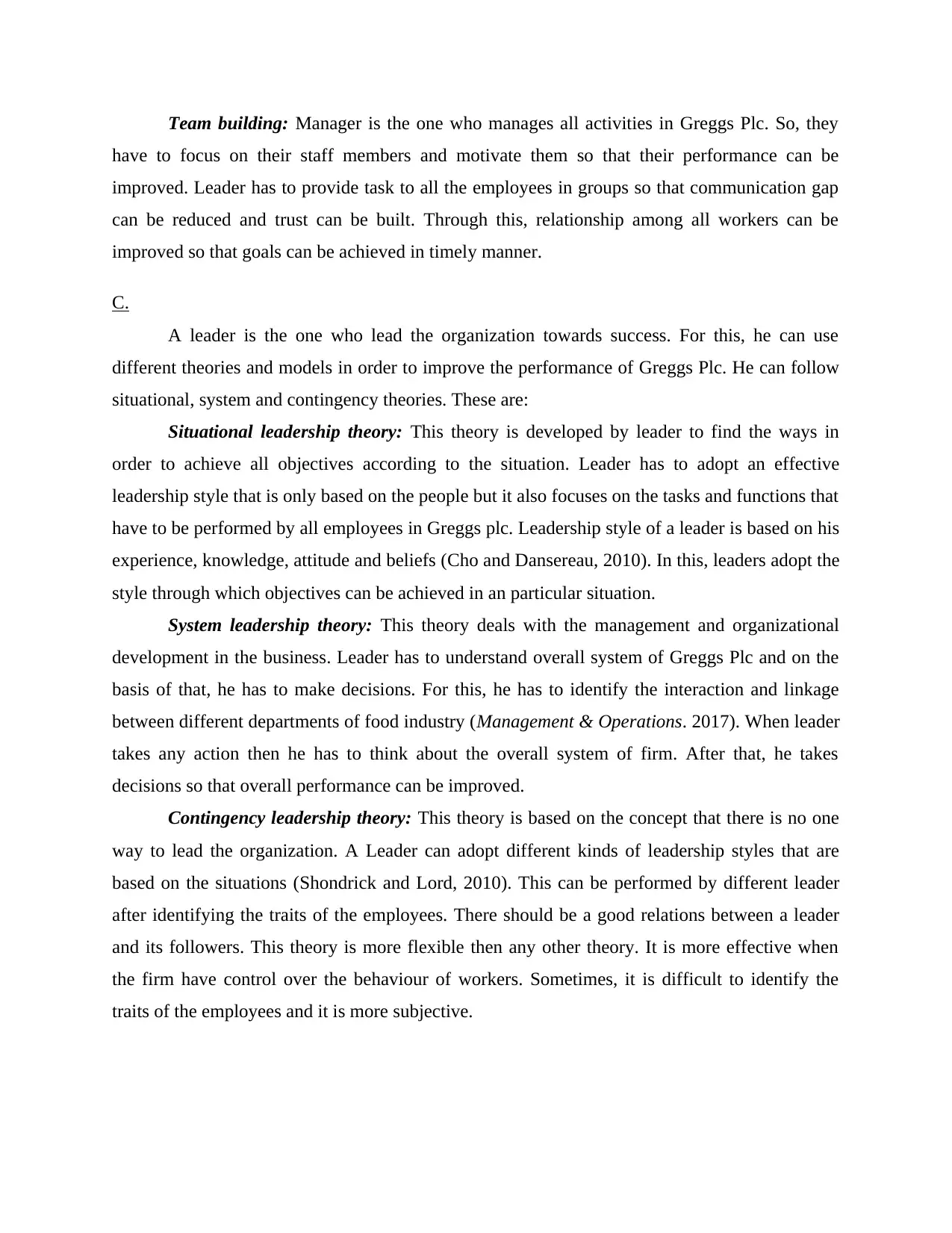
Team building: Manager is the one who manages all activities in Greggs Plc. So, they
have to focus on their staff members and motivate them so that their performance can be
improved. Leader has to provide task to all the employees in groups so that communication gap
can be reduced and trust can be built. Through this, relationship among all workers can be
improved so that goals can be achieved in timely manner.
C.
A leader is the one who lead the organization towards success. For this, he can use
different theories and models in order to improve the performance of Greggs Plc. He can follow
situational, system and contingency theories. These are:
Situational leadership theory: This theory is developed by leader to find the ways in
order to achieve all objectives according to the situation. Leader has to adopt an effective
leadership style that is only based on the people but it also focuses on the tasks and functions that
have to be performed by all employees in Greggs plc. Leadership style of a leader is based on his
experience, knowledge, attitude and beliefs (Cho and Dansereau, 2010). In this, leaders adopt the
style through which objectives can be achieved in an particular situation.
System leadership theory: This theory deals with the management and organizational
development in the business. Leader has to understand overall system of Greggs Plc and on the
basis of that, he has to make decisions. For this, he has to identify the interaction and linkage
between different departments of food industry (Management & Operations. 2017). When leader
takes any action then he has to think about the overall system of firm. After that, he takes
decisions so that overall performance can be improved.
Contingency leadership theory: This theory is based on the concept that there is no one
way to lead the organization. A Leader can adopt different kinds of leadership styles that are
based on the situations (Shondrick and Lord, 2010). This can be performed by different leader
after identifying the traits of the employees. There should be a good relations between a leader
and its followers. This theory is more flexible then any other theory. It is more effective when
the firm have control over the behaviour of workers. Sometimes, it is difficult to identify the
traits of the employees and it is more subjective.
have to focus on their staff members and motivate them so that their performance can be
improved. Leader has to provide task to all the employees in groups so that communication gap
can be reduced and trust can be built. Through this, relationship among all workers can be
improved so that goals can be achieved in timely manner.
C.
A leader is the one who lead the organization towards success. For this, he can use
different theories and models in order to improve the performance of Greggs Plc. He can follow
situational, system and contingency theories. These are:
Situational leadership theory: This theory is developed by leader to find the ways in
order to achieve all objectives according to the situation. Leader has to adopt an effective
leadership style that is only based on the people but it also focuses on the tasks and functions that
have to be performed by all employees in Greggs plc. Leadership style of a leader is based on his
experience, knowledge, attitude and beliefs (Cho and Dansereau, 2010). In this, leaders adopt the
style through which objectives can be achieved in an particular situation.
System leadership theory: This theory deals with the management and organizational
development in the business. Leader has to understand overall system of Greggs Plc and on the
basis of that, he has to make decisions. For this, he has to identify the interaction and linkage
between different departments of food industry (Management & Operations. 2017). When leader
takes any action then he has to think about the overall system of firm. After that, he takes
decisions so that overall performance can be improved.
Contingency leadership theory: This theory is based on the concept that there is no one
way to lead the organization. A Leader can adopt different kinds of leadership styles that are
based on the situations (Shondrick and Lord, 2010). This can be performed by different leader
after identifying the traits of the employees. There should be a good relations between a leader
and its followers. This theory is more flexible then any other theory. It is more effective when
the firm have control over the behaviour of workers. Sometimes, it is difficult to identify the
traits of the employees and it is more subjective.
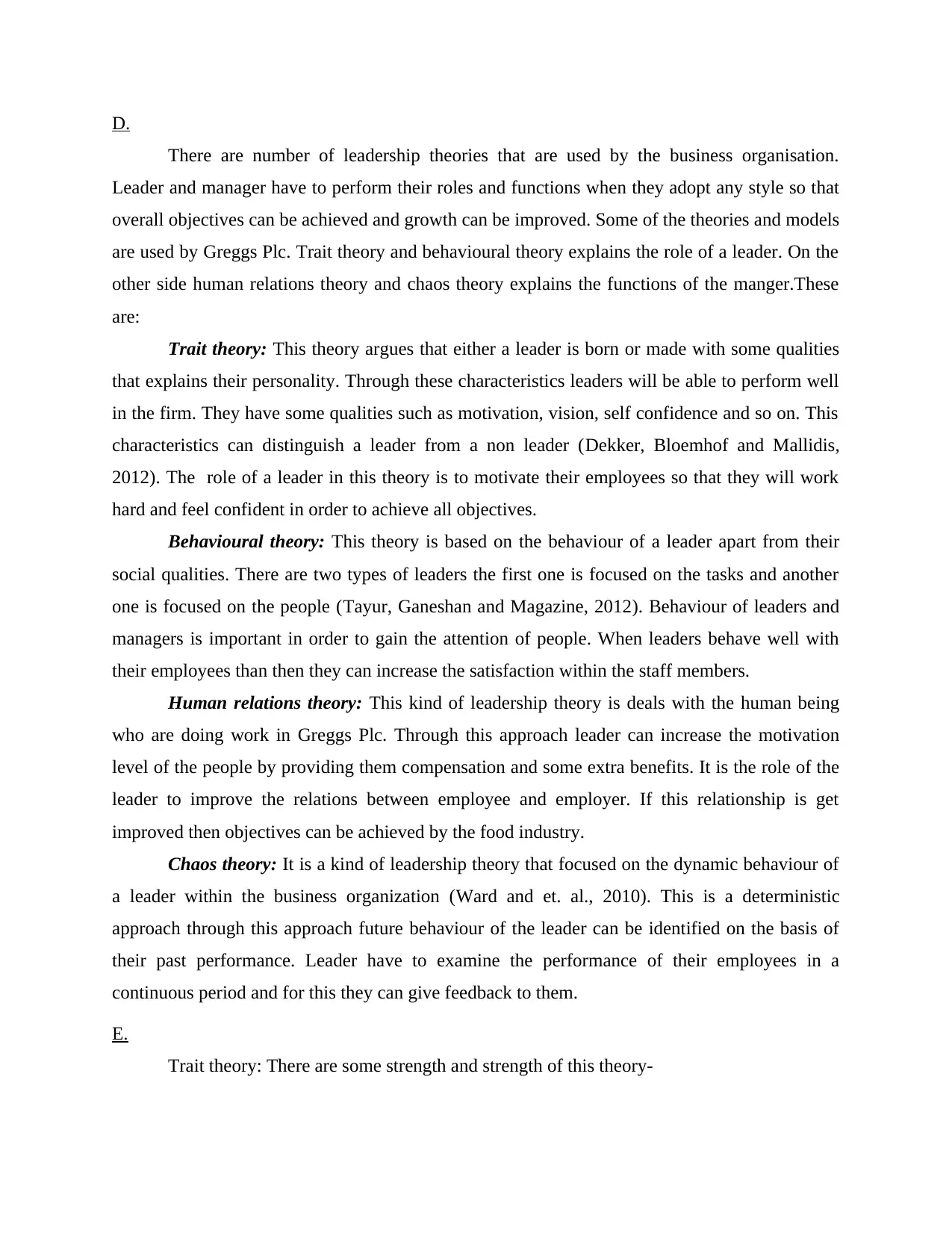
D.
There are number of leadership theories that are used by the business organisation.
Leader and manager have to perform their roles and functions when they adopt any style so that
overall objectives can be achieved and growth can be improved. Some of the theories and models
are used by Greggs Plc. Trait theory and behavioural theory explains the role of a leader. On the
other side human relations theory and chaos theory explains the functions of the manger.These
are:
Trait theory: This theory argues that either a leader is born or made with some qualities
that explains their personality. Through these characteristics leaders will be able to perform well
in the firm. They have some qualities such as motivation, vision, self confidence and so on. This
characteristics can distinguish a leader from a non leader (Dekker, Bloemhof and Mallidis,
2012). The role of a leader in this theory is to motivate their employees so that they will work
hard and feel confident in order to achieve all objectives.
Behavioural theory: This theory is based on the behaviour of a leader apart from their
social qualities. There are two types of leaders the first one is focused on the tasks and another
one is focused on the people (Tayur, Ganeshan and Magazine, 2012). Behaviour of leaders and
managers is important in order to gain the attention of people. When leaders behave well with
their employees than then they can increase the satisfaction within the staff members.
Human relations theory: This kind of leadership theory is deals with the human being
who are doing work in Greggs Plc. Through this approach leader can increase the motivation
level of the people by providing them compensation and some extra benefits. It is the role of the
leader to improve the relations between employee and employer. If this relationship is get
improved then objectives can be achieved by the food industry.
Chaos theory: It is a kind of leadership theory that focused on the dynamic behaviour of
a leader within the business organization (Ward and et. al., 2010). This is a deterministic
approach through this approach future behaviour of the leader can be identified on the basis of
their past performance. Leader have to examine the performance of their employees in a
continuous period and for this they can give feedback to them.
E.
Trait theory: There are some strength and strength of this theory-
There are number of leadership theories that are used by the business organisation.
Leader and manager have to perform their roles and functions when they adopt any style so that
overall objectives can be achieved and growth can be improved. Some of the theories and models
are used by Greggs Plc. Trait theory and behavioural theory explains the role of a leader. On the
other side human relations theory and chaos theory explains the functions of the manger.These
are:
Trait theory: This theory argues that either a leader is born or made with some qualities
that explains their personality. Through these characteristics leaders will be able to perform well
in the firm. They have some qualities such as motivation, vision, self confidence and so on. This
characteristics can distinguish a leader from a non leader (Dekker, Bloemhof and Mallidis,
2012). The role of a leader in this theory is to motivate their employees so that they will work
hard and feel confident in order to achieve all objectives.
Behavioural theory: This theory is based on the behaviour of a leader apart from their
social qualities. There are two types of leaders the first one is focused on the tasks and another
one is focused on the people (Tayur, Ganeshan and Magazine, 2012). Behaviour of leaders and
managers is important in order to gain the attention of people. When leaders behave well with
their employees than then they can increase the satisfaction within the staff members.
Human relations theory: This kind of leadership theory is deals with the human being
who are doing work in Greggs Plc. Through this approach leader can increase the motivation
level of the people by providing them compensation and some extra benefits. It is the role of the
leader to improve the relations between employee and employer. If this relationship is get
improved then objectives can be achieved by the food industry.
Chaos theory: It is a kind of leadership theory that focused on the dynamic behaviour of
a leader within the business organization (Ward and et. al., 2010). This is a deterministic
approach through this approach future behaviour of the leader can be identified on the basis of
their past performance. Leader have to examine the performance of their employees in a
continuous period and for this they can give feedback to them.
E.
Trait theory: There are some strength and strength of this theory-
⊘ This is a preview!⊘
Do you want full access?
Subscribe today to unlock all pages.

Trusted by 1+ million students worldwide
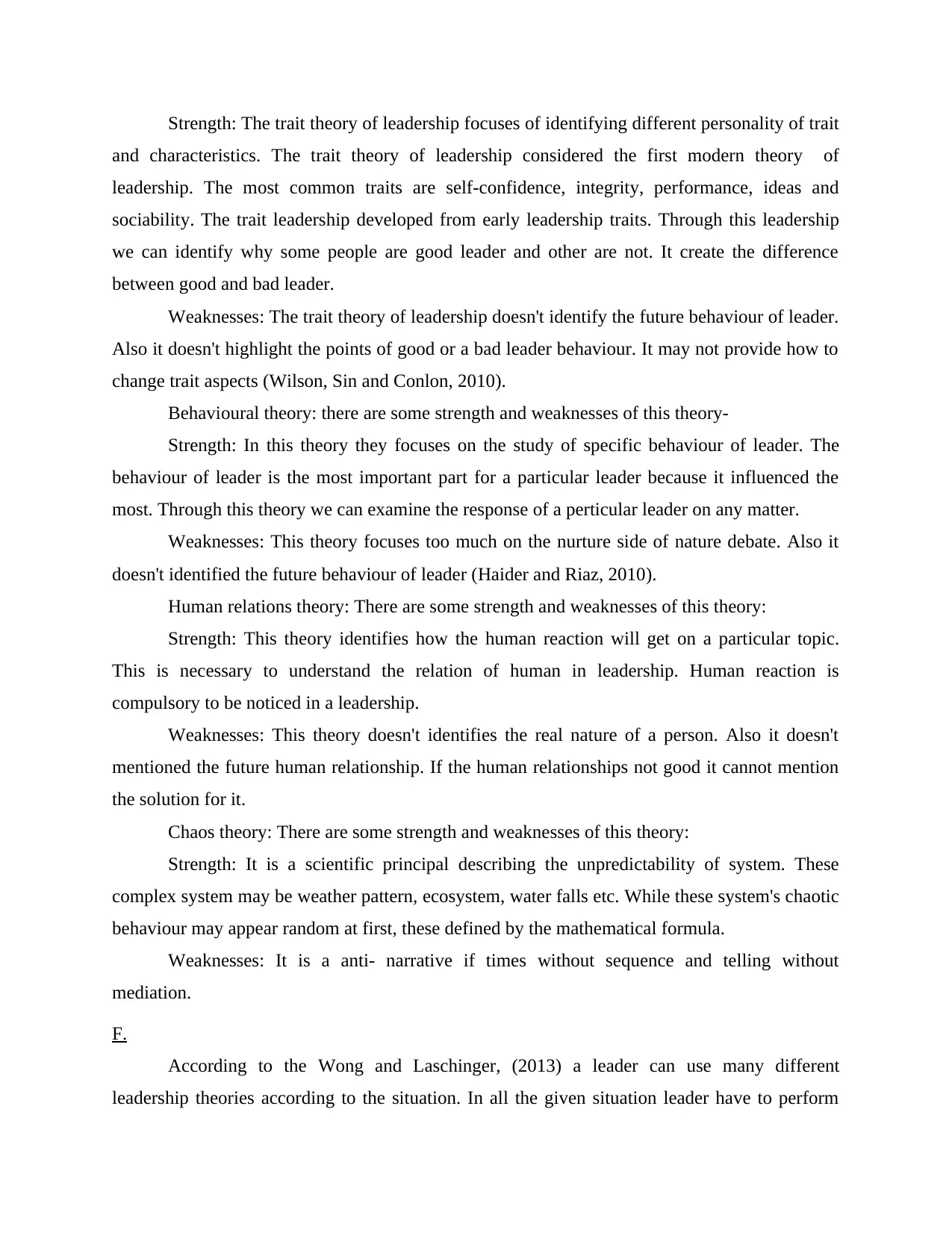
Strength: The trait theory of leadership focuses of identifying different personality of trait
and characteristics. The trait theory of leadership considered the first modern theory of
leadership. The most common traits are self-confidence, integrity, performance, ideas and
sociability. The trait leadership developed from early leadership traits. Through this leadership
we can identify why some people are good leader and other are not. It create the difference
between good and bad leader.
Weaknesses: The trait theory of leadership doesn't identify the future behaviour of leader.
Also it doesn't highlight the points of good or a bad leader behaviour. It may not provide how to
change trait aspects (Wilson, Sin and Conlon, 2010).
Behavioural theory: there are some strength and weaknesses of this theory-
Strength: In this theory they focuses on the study of specific behaviour of leader. The
behaviour of leader is the most important part for a particular leader because it influenced the
most. Through this theory we can examine the response of a perticular leader on any matter.
Weaknesses: This theory focuses too much on the nurture side of nature debate. Also it
doesn't identified the future behaviour of leader (Haider and Riaz, 2010).
Human relations theory: There are some strength and weaknesses of this theory:
Strength: This theory identifies how the human reaction will get on a particular topic.
This is necessary to understand the relation of human in leadership. Human reaction is
compulsory to be noticed in a leadership.
Weaknesses: This theory doesn't identifies the real nature of a person. Also it doesn't
mentioned the future human relationship. If the human relationships not good it cannot mention
the solution for it.
Chaos theory: There are some strength and weaknesses of this theory:
Strength: It is a scientific principal describing the unpredictability of system. These
complex system may be weather pattern, ecosystem, water falls etc. While these system's chaotic
behaviour may appear random at first, these defined by the mathematical formula.
Weaknesses: It is a anti- narrative if times without sequence and telling without
mediation.
F.
According to the Wong and Laschinger, (2013) a leader can use many different
leadership theories according to the situation. In all the given situation leader have to perform
and characteristics. The trait theory of leadership considered the first modern theory of
leadership. The most common traits are self-confidence, integrity, performance, ideas and
sociability. The trait leadership developed from early leadership traits. Through this leadership
we can identify why some people are good leader and other are not. It create the difference
between good and bad leader.
Weaknesses: The trait theory of leadership doesn't identify the future behaviour of leader.
Also it doesn't highlight the points of good or a bad leader behaviour. It may not provide how to
change trait aspects (Wilson, Sin and Conlon, 2010).
Behavioural theory: there are some strength and weaknesses of this theory-
Strength: In this theory they focuses on the study of specific behaviour of leader. The
behaviour of leader is the most important part for a particular leader because it influenced the
most. Through this theory we can examine the response of a perticular leader on any matter.
Weaknesses: This theory focuses too much on the nurture side of nature debate. Also it
doesn't identified the future behaviour of leader (Haider and Riaz, 2010).
Human relations theory: There are some strength and weaknesses of this theory:
Strength: This theory identifies how the human reaction will get on a particular topic.
This is necessary to understand the relation of human in leadership. Human reaction is
compulsory to be noticed in a leadership.
Weaknesses: This theory doesn't identifies the real nature of a person. Also it doesn't
mentioned the future human relationship. If the human relationships not good it cannot mention
the solution for it.
Chaos theory: There are some strength and weaknesses of this theory:
Strength: It is a scientific principal describing the unpredictability of system. These
complex system may be weather pattern, ecosystem, water falls etc. While these system's chaotic
behaviour may appear random at first, these defined by the mathematical formula.
Weaknesses: It is a anti- narrative if times without sequence and telling without
mediation.
F.
According to the Wong and Laschinger, (2013) a leader can use many different
leadership theories according to the situation. In all the given situation leader have to perform
Paraphrase This Document
Need a fresh take? Get an instant paraphrase of this document with our AI Paraphraser
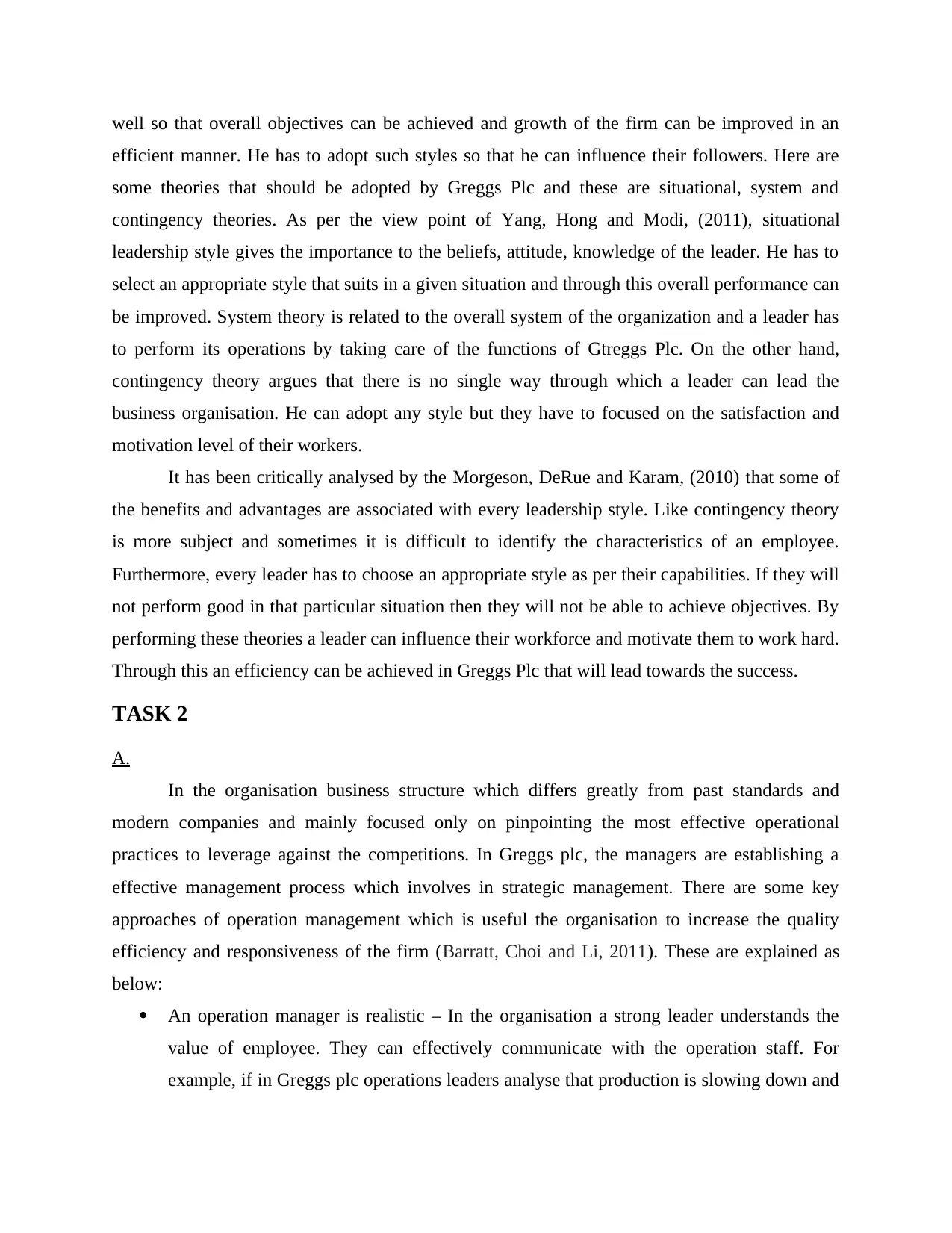
well so that overall objectives can be achieved and growth of the firm can be improved in an
efficient manner. He has to adopt such styles so that he can influence their followers. Here are
some theories that should be adopted by Greggs Plc and these are situational, system and
contingency theories. As per the view point of Yang, Hong and Modi, (2011), situational
leadership style gives the importance to the beliefs, attitude, knowledge of the leader. He has to
select an appropriate style that suits in a given situation and through this overall performance can
be improved. System theory is related to the overall system of the organization and a leader has
to perform its operations by taking care of the functions of Gtreggs Plc. On the other hand,
contingency theory argues that there is no single way through which a leader can lead the
business organisation. He can adopt any style but they have to focused on the satisfaction and
motivation level of their workers.
It has been critically analysed by the Morgeson, DeRue and Karam, (2010) that some of
the benefits and advantages are associated with every leadership style. Like contingency theory
is more subject and sometimes it is difficult to identify the characteristics of an employee.
Furthermore, every leader has to choose an appropriate style as per their capabilities. If they will
not perform good in that particular situation then they will not be able to achieve objectives. By
performing these theories a leader can influence their workforce and motivate them to work hard.
Through this an efficiency can be achieved in Greggs Plc that will lead towards the success.
TASK 2
A.
In the organisation business structure which differs greatly from past standards and
modern companies and mainly focused only on pinpointing the most effective operational
practices to leverage against the competitions. In Greggs plc, the managers are establishing a
effective management process which involves in strategic management. There are some key
approaches of operation management which is useful the organisation to increase the quality
efficiency and responsiveness of the firm (Barratt, Choi and Li, 2011). These are explained as
below:
An operation manager is realistic – In the organisation a strong leader understands the
value of employee. They can effectively communicate with the operation staff. For
example, if in Greggs plc operations leaders analyse that production is slowing down and
efficient manner. He has to adopt such styles so that he can influence their followers. Here are
some theories that should be adopted by Greggs Plc and these are situational, system and
contingency theories. As per the view point of Yang, Hong and Modi, (2011), situational
leadership style gives the importance to the beliefs, attitude, knowledge of the leader. He has to
select an appropriate style that suits in a given situation and through this overall performance can
be improved. System theory is related to the overall system of the organization and a leader has
to perform its operations by taking care of the functions of Gtreggs Plc. On the other hand,
contingency theory argues that there is no single way through which a leader can lead the
business organisation. He can adopt any style but they have to focused on the satisfaction and
motivation level of their workers.
It has been critically analysed by the Morgeson, DeRue and Karam, (2010) that some of
the benefits and advantages are associated with every leadership style. Like contingency theory
is more subject and sometimes it is difficult to identify the characteristics of an employee.
Furthermore, every leader has to choose an appropriate style as per their capabilities. If they will
not perform good in that particular situation then they will not be able to achieve objectives. By
performing these theories a leader can influence their workforce and motivate them to work hard.
Through this an efficiency can be achieved in Greggs Plc that will lead towards the success.
TASK 2
A.
In the organisation business structure which differs greatly from past standards and
modern companies and mainly focused only on pinpointing the most effective operational
practices to leverage against the competitions. In Greggs plc, the managers are establishing a
effective management process which involves in strategic management. There are some key
approaches of operation management which is useful the organisation to increase the quality
efficiency and responsiveness of the firm (Barratt, Choi and Li, 2011). These are explained as
below:
An operation manager is realistic – In the organisation a strong leader understands the
value of employee. They can effectively communicate with the operation staff. For
example, if in Greggs plc operations leaders analyse that production is slowing down and
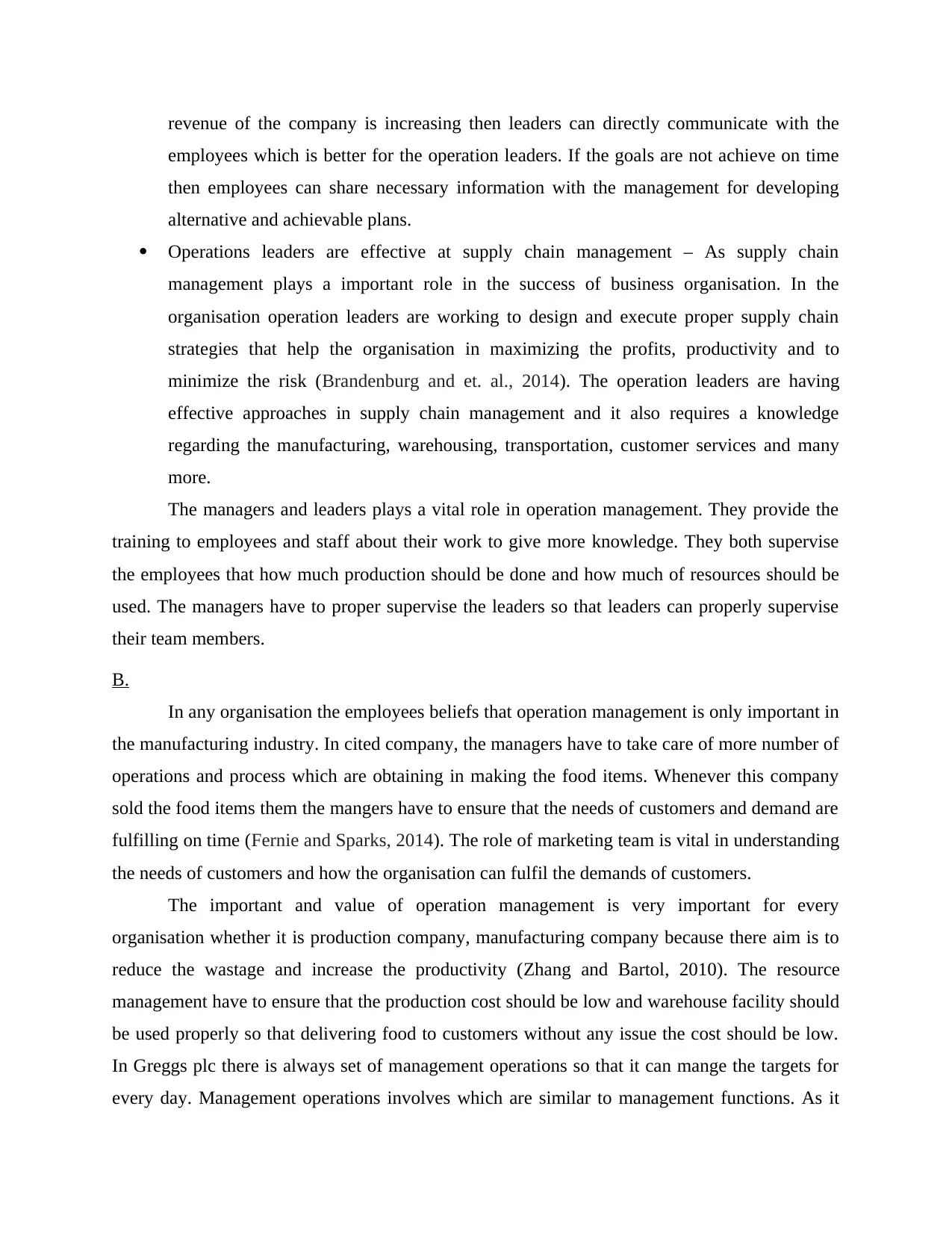
revenue of the company is increasing then leaders can directly communicate with the
employees which is better for the operation leaders. If the goals are not achieve on time
then employees can share necessary information with the management for developing
alternative and achievable plans.
Operations leaders are effective at supply chain management – As supply chain
management plays a important role in the success of business organisation. In the
organisation operation leaders are working to design and execute proper supply chain
strategies that help the organisation in maximizing the profits, productivity and to
minimize the risk (Brandenburg and et. al., 2014). The operation leaders are having
effective approaches in supply chain management and it also requires a knowledge
regarding the manufacturing, warehousing, transportation, customer services and many
more.
The managers and leaders plays a vital role in operation management. They provide the
training to employees and staff about their work to give more knowledge. They both supervise
the employees that how much production should be done and how much of resources should be
used. The managers have to proper supervise the leaders so that leaders can properly supervise
their team members.
B.
In any organisation the employees beliefs that operation management is only important in
the manufacturing industry. In cited company, the managers have to take care of more number of
operations and process which are obtaining in making the food items. Whenever this company
sold the food items them the mangers have to ensure that the needs of customers and demand are
fulfilling on time (Fernie and Sparks, 2014). The role of marketing team is vital in understanding
the needs of customers and how the organisation can fulfil the demands of customers.
The important and value of operation management is very important for every
organisation whether it is production company, manufacturing company because there aim is to
reduce the wastage and increase the productivity (Zhang and Bartol, 2010). The resource
management have to ensure that the production cost should be low and warehouse facility should
be used properly so that delivering food to customers without any issue the cost should be low.
In Greggs plc there is always set of management operations so that it can mange the targets for
every day. Management operations involves which are similar to management functions. As it
employees which is better for the operation leaders. If the goals are not achieve on time
then employees can share necessary information with the management for developing
alternative and achievable plans.
Operations leaders are effective at supply chain management – As supply chain
management plays a important role in the success of business organisation. In the
organisation operation leaders are working to design and execute proper supply chain
strategies that help the organisation in maximizing the profits, productivity and to
minimize the risk (Brandenburg and et. al., 2014). The operation leaders are having
effective approaches in supply chain management and it also requires a knowledge
regarding the manufacturing, warehousing, transportation, customer services and many
more.
The managers and leaders plays a vital role in operation management. They provide the
training to employees and staff about their work to give more knowledge. They both supervise
the employees that how much production should be done and how much of resources should be
used. The managers have to proper supervise the leaders so that leaders can properly supervise
their team members.
B.
In any organisation the employees beliefs that operation management is only important in
the manufacturing industry. In cited company, the managers have to take care of more number of
operations and process which are obtaining in making the food items. Whenever this company
sold the food items them the mangers have to ensure that the needs of customers and demand are
fulfilling on time (Fernie and Sparks, 2014). The role of marketing team is vital in understanding
the needs of customers and how the organisation can fulfil the demands of customers.
The important and value of operation management is very important for every
organisation whether it is production company, manufacturing company because there aim is to
reduce the wastage and increase the productivity (Zhang and Bartol, 2010). The resource
management have to ensure that the production cost should be low and warehouse facility should
be used properly so that delivering food to customers without any issue the cost should be low.
In Greggs plc there is always set of management operations so that it can mange the targets for
every day. Management operations involves which are similar to management functions. As it
⊘ This is a preview!⊘
Do you want full access?
Subscribe today to unlock all pages.

Trusted by 1+ million students worldwide
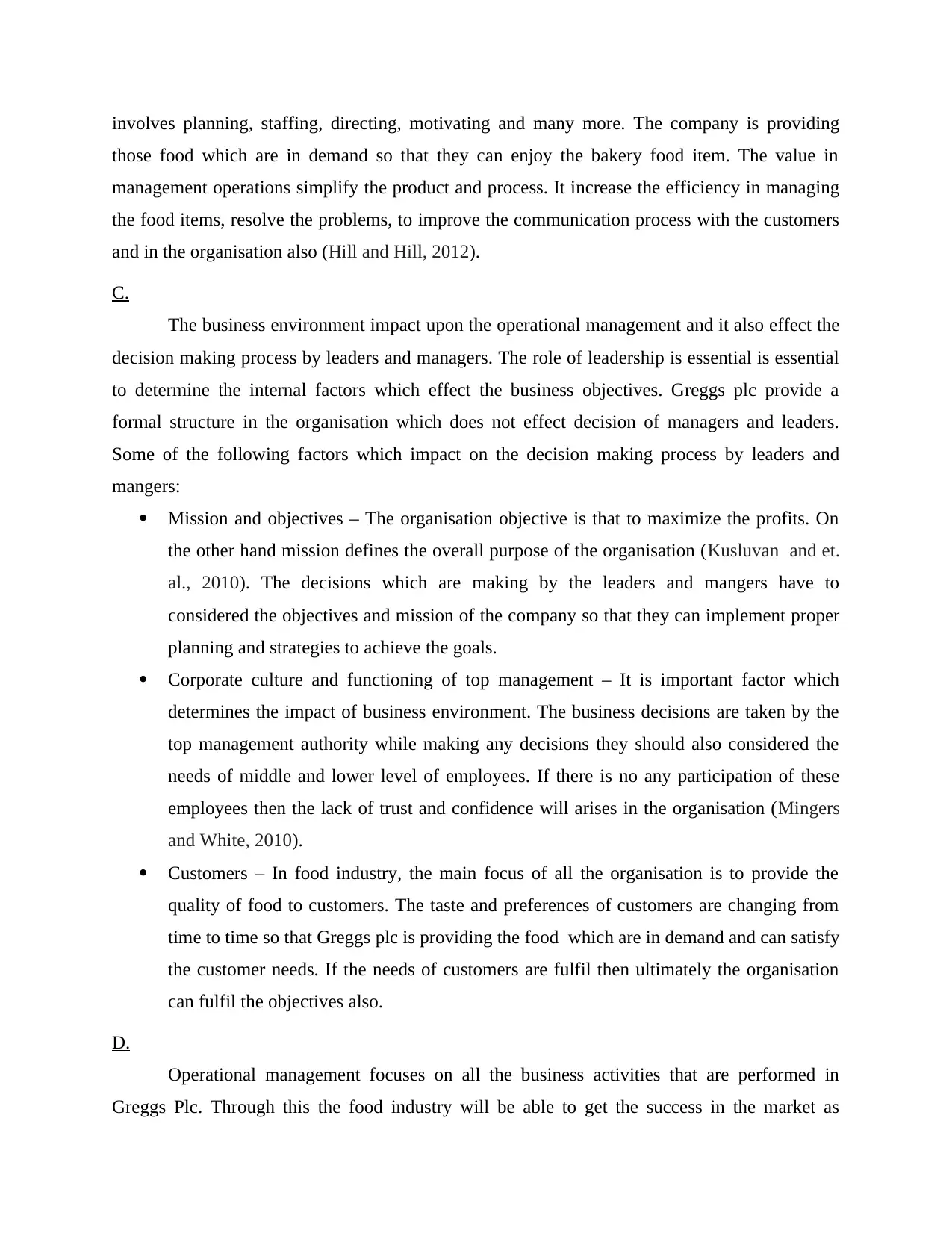
involves planning, staffing, directing, motivating and many more. The company is providing
those food which are in demand so that they can enjoy the bakery food item. The value in
management operations simplify the product and process. It increase the efficiency in managing
the food items, resolve the problems, to improve the communication process with the customers
and in the organisation also (Hill and Hill, 2012).
C.
The business environment impact upon the operational management and it also effect the
decision making process by leaders and managers. The role of leadership is essential is essential
to determine the internal factors which effect the business objectives. Greggs plc provide a
formal structure in the organisation which does not effect decision of managers and leaders.
Some of the following factors which impact on the decision making process by leaders and
mangers:
Mission and objectives – The organisation objective is that to maximize the profits. On
the other hand mission defines the overall purpose of the organisation (Kusluvan and et.
al., 2010). The decisions which are making by the leaders and mangers have to
considered the objectives and mission of the company so that they can implement proper
planning and strategies to achieve the goals.
Corporate culture and functioning of top management – It is important factor which
determines the impact of business environment. The business decisions are taken by the
top management authority while making any decisions they should also considered the
needs of middle and lower level of employees. If there is no any participation of these
employees then the lack of trust and confidence will arises in the organisation (Mingers
and White, 2010).
Customers – In food industry, the main focus of all the organisation is to provide the
quality of food to customers. The taste and preferences of customers are changing from
time to time so that Greggs plc is providing the food which are in demand and can satisfy
the customer needs. If the needs of customers are fulfil then ultimately the organisation
can fulfil the objectives also.
D.
Operational management focuses on all the business activities that are performed in
Greggs Plc. Through this the food industry will be able to get the success in the market as
those food which are in demand so that they can enjoy the bakery food item. The value in
management operations simplify the product and process. It increase the efficiency in managing
the food items, resolve the problems, to improve the communication process with the customers
and in the organisation also (Hill and Hill, 2012).
C.
The business environment impact upon the operational management and it also effect the
decision making process by leaders and managers. The role of leadership is essential is essential
to determine the internal factors which effect the business objectives. Greggs plc provide a
formal structure in the organisation which does not effect decision of managers and leaders.
Some of the following factors which impact on the decision making process by leaders and
mangers:
Mission and objectives – The organisation objective is that to maximize the profits. On
the other hand mission defines the overall purpose of the organisation (Kusluvan and et.
al., 2010). The decisions which are making by the leaders and mangers have to
considered the objectives and mission of the company so that they can implement proper
planning and strategies to achieve the goals.
Corporate culture and functioning of top management – It is important factor which
determines the impact of business environment. The business decisions are taken by the
top management authority while making any decisions they should also considered the
needs of middle and lower level of employees. If there is no any participation of these
employees then the lack of trust and confidence will arises in the organisation (Mingers
and White, 2010).
Customers – In food industry, the main focus of all the organisation is to provide the
quality of food to customers. The taste and preferences of customers are changing from
time to time so that Greggs plc is providing the food which are in demand and can satisfy
the customer needs. If the needs of customers are fulfil then ultimately the organisation
can fulfil the objectives also.
D.
Operational management focuses on all the business activities that are performed in
Greggs Plc. Through this the food industry will be able to get the success in the market as
Paraphrase This Document
Need a fresh take? Get an instant paraphrase of this document with our AI Paraphraser
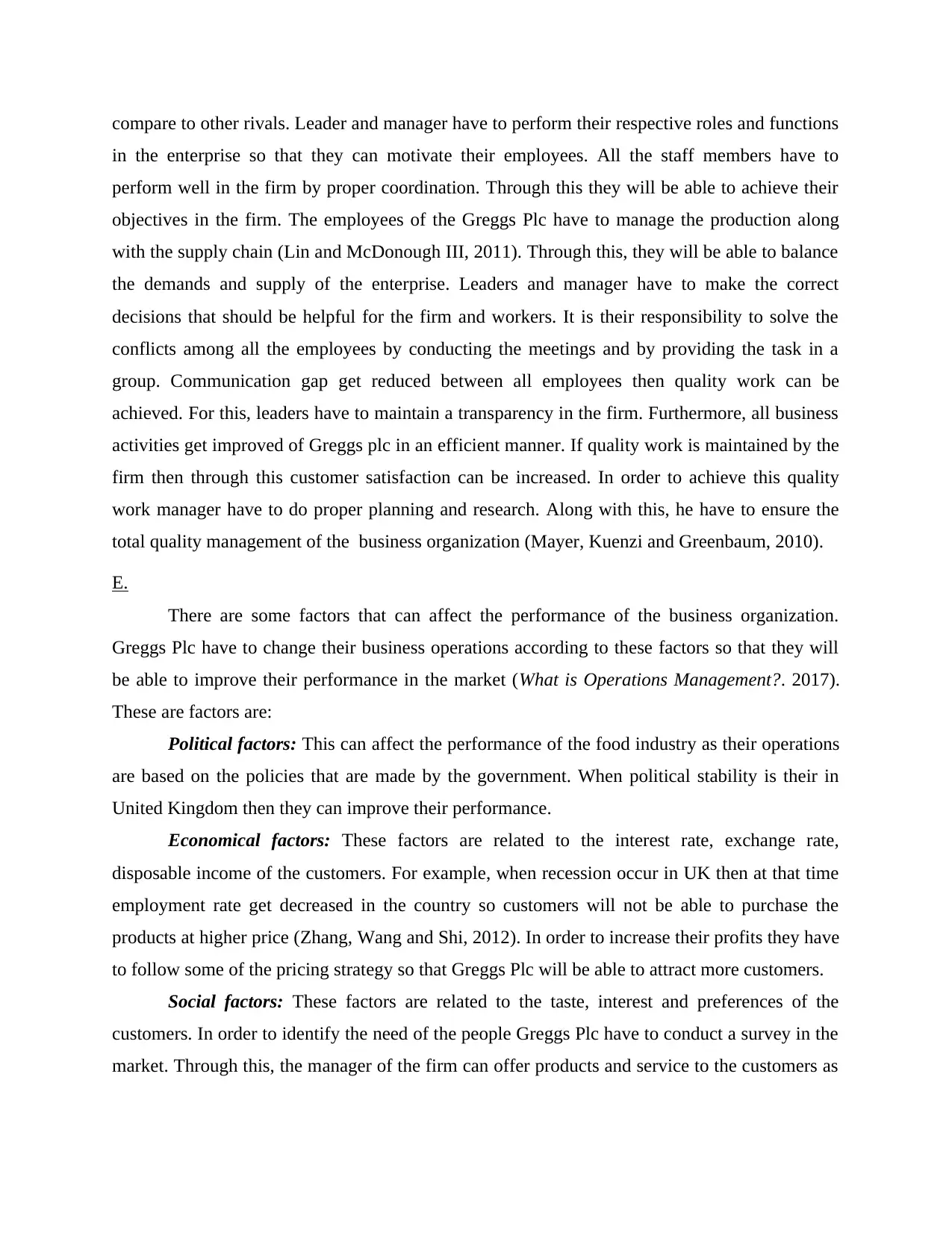
compare to other rivals. Leader and manager have to perform their respective roles and functions
in the enterprise so that they can motivate their employees. All the staff members have to
perform well in the firm by proper coordination. Through this they will be able to achieve their
objectives in the firm. The employees of the Greggs Plc have to manage the production along
with the supply chain (Lin and McDonough III, 2011). Through this, they will be able to balance
the demands and supply of the enterprise. Leaders and manager have to make the correct
decisions that should be helpful for the firm and workers. It is their responsibility to solve the
conflicts among all the employees by conducting the meetings and by providing the task in a
group. Communication gap get reduced between all employees then quality work can be
achieved. For this, leaders have to maintain a transparency in the firm. Furthermore, all business
activities get improved of Greggs plc in an efficient manner. If quality work is maintained by the
firm then through this customer satisfaction can be increased. In order to achieve this quality
work manager have to do proper planning and research. Along with this, he have to ensure the
total quality management of the business organization (Mayer, Kuenzi and Greenbaum, 2010).
E.
There are some factors that can affect the performance of the business organization.
Greggs Plc have to change their business operations according to these factors so that they will
be able to improve their performance in the market (What is Operations Management?. 2017).
These are factors are:
Political factors: This can affect the performance of the food industry as their operations
are based on the policies that are made by the government. When political stability is their in
United Kingdom then they can improve their performance.
Economical factors: These factors are related to the interest rate, exchange rate,
disposable income of the customers. For example, when recession occur in UK then at that time
employment rate get decreased in the country so customers will not be able to purchase the
products at higher price (Zhang, Wang and Shi, 2012). In order to increase their profits they have
to follow some of the pricing strategy so that Greggs Plc will be able to attract more customers.
Social factors: These factors are related to the taste, interest and preferences of the
customers. In order to identify the need of the people Greggs Plc have to conduct a survey in the
market. Through this, the manager of the firm can offer products and service to the customers as
in the enterprise so that they can motivate their employees. All the staff members have to
perform well in the firm by proper coordination. Through this they will be able to achieve their
objectives in the firm. The employees of the Greggs Plc have to manage the production along
with the supply chain (Lin and McDonough III, 2011). Through this, they will be able to balance
the demands and supply of the enterprise. Leaders and manager have to make the correct
decisions that should be helpful for the firm and workers. It is their responsibility to solve the
conflicts among all the employees by conducting the meetings and by providing the task in a
group. Communication gap get reduced between all employees then quality work can be
achieved. For this, leaders have to maintain a transparency in the firm. Furthermore, all business
activities get improved of Greggs plc in an efficient manner. If quality work is maintained by the
firm then through this customer satisfaction can be increased. In order to achieve this quality
work manager have to do proper planning and research. Along with this, he have to ensure the
total quality management of the business organization (Mayer, Kuenzi and Greenbaum, 2010).
E.
There are some factors that can affect the performance of the business organization.
Greggs Plc have to change their business operations according to these factors so that they will
be able to improve their performance in the market (What is Operations Management?. 2017).
These are factors are:
Political factors: This can affect the performance of the food industry as their operations
are based on the policies that are made by the government. When political stability is their in
United Kingdom then they can improve their performance.
Economical factors: These factors are related to the interest rate, exchange rate,
disposable income of the customers. For example, when recession occur in UK then at that time
employment rate get decreased in the country so customers will not be able to purchase the
products at higher price (Zhang, Wang and Shi, 2012). In order to increase their profits they have
to follow some of the pricing strategy so that Greggs Plc will be able to attract more customers.
Social factors: These factors are related to the taste, interest and preferences of the
customers. In order to identify the need of the people Greggs Plc have to conduct a survey in the
market. Through this, the manager of the firm can offer products and service to the customers as
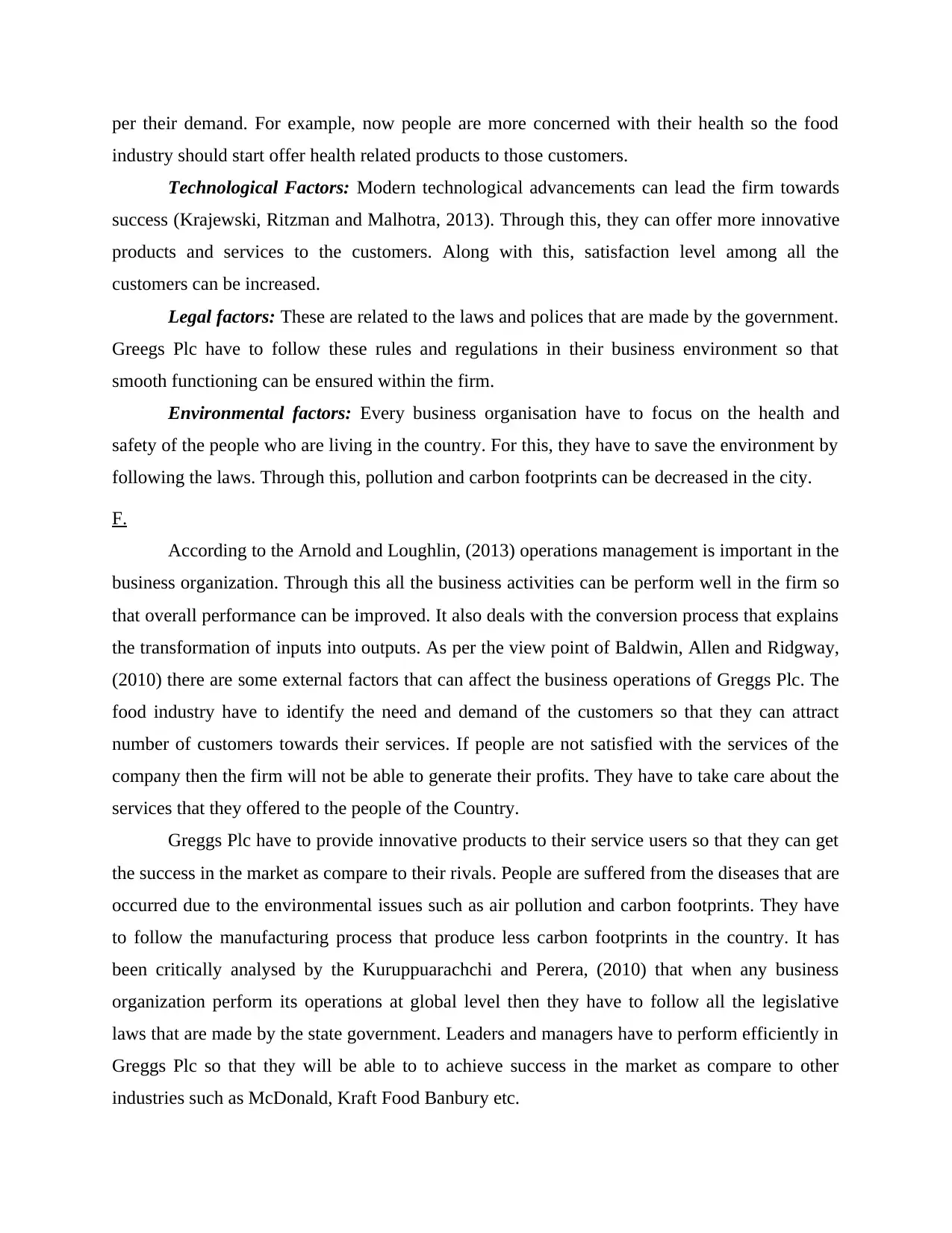
per their demand. For example, now people are more concerned with their health so the food
industry should start offer health related products to those customers.
Technological Factors: Modern technological advancements can lead the firm towards
success (Krajewski, Ritzman and Malhotra, 2013). Through this, they can offer more innovative
products and services to the customers. Along with this, satisfaction level among all the
customers can be increased.
Legal factors: These are related to the laws and polices that are made by the government.
Greegs Plc have to follow these rules and regulations in their business environment so that
smooth functioning can be ensured within the firm.
Environmental factors: Every business organisation have to focus on the health and
safety of the people who are living in the country. For this, they have to save the environment by
following the laws. Through this, pollution and carbon footprints can be decreased in the city.
F.
According to the Arnold and Loughlin, (2013) operations management is important in the
business organization. Through this all the business activities can be perform well in the firm so
that overall performance can be improved. It also deals with the conversion process that explains
the transformation of inputs into outputs. As per the view point of Baldwin, Allen and Ridgway,
(2010) there are some external factors that can affect the business operations of Greggs Plc. The
food industry have to identify the need and demand of the customers so that they can attract
number of customers towards their services. If people are not satisfied with the services of the
company then the firm will not be able to generate their profits. They have to take care about the
services that they offered to the people of the Country.
Greggs Plc have to provide innovative products to their service users so that they can get
the success in the market as compare to their rivals. People are suffered from the diseases that are
occurred due to the environmental issues such as air pollution and carbon footprints. They have
to follow the manufacturing process that produce less carbon footprints in the country. It has
been critically analysed by the Kuruppuarachchi and Perera, (2010) that when any business
organization perform its operations at global level then they have to follow all the legislative
laws that are made by the state government. Leaders and managers have to perform efficiently in
Greggs Plc so that they will be able to to achieve success in the market as compare to other
industries such as McDonald, Kraft Food Banbury etc.
industry should start offer health related products to those customers.
Technological Factors: Modern technological advancements can lead the firm towards
success (Krajewski, Ritzman and Malhotra, 2013). Through this, they can offer more innovative
products and services to the customers. Along with this, satisfaction level among all the
customers can be increased.
Legal factors: These are related to the laws and polices that are made by the government.
Greegs Plc have to follow these rules and regulations in their business environment so that
smooth functioning can be ensured within the firm.
Environmental factors: Every business organisation have to focus on the health and
safety of the people who are living in the country. For this, they have to save the environment by
following the laws. Through this, pollution and carbon footprints can be decreased in the city.
F.
According to the Arnold and Loughlin, (2013) operations management is important in the
business organization. Through this all the business activities can be perform well in the firm so
that overall performance can be improved. It also deals with the conversion process that explains
the transformation of inputs into outputs. As per the view point of Baldwin, Allen and Ridgway,
(2010) there are some external factors that can affect the business operations of Greggs Plc. The
food industry have to identify the need and demand of the customers so that they can attract
number of customers towards their services. If people are not satisfied with the services of the
company then the firm will not be able to generate their profits. They have to take care about the
services that they offered to the people of the Country.
Greggs Plc have to provide innovative products to their service users so that they can get
the success in the market as compare to their rivals. People are suffered from the diseases that are
occurred due to the environmental issues such as air pollution and carbon footprints. They have
to follow the manufacturing process that produce less carbon footprints in the country. It has
been critically analysed by the Kuruppuarachchi and Perera, (2010) that when any business
organization perform its operations at global level then they have to follow all the legislative
laws that are made by the state government. Leaders and managers have to perform efficiently in
Greggs Plc so that they will be able to to achieve success in the market as compare to other
industries such as McDonald, Kraft Food Banbury etc.
⊘ This is a preview!⊘
Do you want full access?
Subscribe today to unlock all pages.

Trusted by 1+ million students worldwide
1 out of 16
Related Documents
Your All-in-One AI-Powered Toolkit for Academic Success.
+13062052269
info@desklib.com
Available 24*7 on WhatsApp / Email
![[object Object]](/_next/static/media/star-bottom.7253800d.svg)
Unlock your academic potential
Copyright © 2020–2026 A2Z Services. All Rights Reserved. Developed and managed by ZUCOL.





